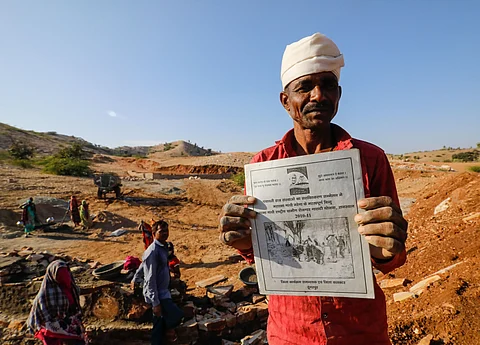

The Union Ministry of Rural Development has issued new guidelines for the deletion and restoration of job cards under the Mahatma Gandhi National Rural Employment Guarantee Act (MGNREGA), following mounting criticism over the removal of more than 15 million active workers from the scheme in the past two years.
Between 2022 and 2024, approximately 15.5 million workers were deleted from MGNREGA rolls. The government has attributed these deletions to a range of reasons, including duplicate or incorrect entries, families migrating out of their registered Gram Panchayats, or rural areas being reclassified as urban settlements.
A job card under MGNREGA serves as proof of eligibility, allowing rural households to access up to 100 days of paid employment per year. The deletions, however, have sparked concern among labour rights groups, who allege that many were removed without due process.
In a written reply to Parliament in February 4, 2025, the government stated that 8.61 million and 6.88 million active workers were deleted or removed from MGNREGA records during the financial years 2022-23 and 2023-24, respectively. For 2024-25, as of March 28, 2025, data from the scheme’s Management Information System shows that 3,915,092 household jobcards have been deleted.
Organisations such as NREGA Sangharsh Morcha, LibTech India and activists including Nikhil Dey of the Mazdoor Kisan Shakti Sangathan and the Satark Nagrik Sangathan, have argued that large-scale deletions were arbitrary and violated workers' rights.
In response, the Ministry’s MGNREGA division under the Department of Rural Development has released a Standard Operating Procedure (SOP) for the first time to standardise the process of deletion and provide a pathway for restoration. The SOP also includes a grievance redressal mechanism and an appeals process to safeguard the rights of workers.
The 10-page guidelines, issued to all state governments, emphasise transparency, accountability and adherence to the provisions of the MGNREGA Act.
The Centre has instructed state governments to ensure full compliance with the provisions of the MGNREGA Act, emphasising that deletions of job cards must not infringe on workers’ rights or bypass due process.
The new guidelines lay out a participatory framework for deletions, mandating that every worker flagged for removal be given an opportunity to respond — either orally or in writing. All grievances must be handled in accordance with the scheme’s established Grievance Redressal Mechanism.
“All job cards / workers deletions shall only take place after due verification in the Gram Sabha held for approving the shelf of works under MGNREGA, or in the social audit Gram Sabha, or in a Special Gram Sabha called for the purpose,” the guidelines said.
Programme officers are required to publish a list of workers proposed for deletion at least 30 days in advance of such a Gram Sabha. This list must be publicly displayed at Gram Panchayat offices, Anganwadi centres, post offices, and ration shops, and also communicated directly to workers via text messages or voice call to their registered mobile numbers.
Workers may submit objections in writing to the Gram Rozgar Sahayak, the Gram Panchayat office, or the programme officer, and are entitled to attach any supporting documents. All objections must be acknowledged with a dated receipt.
Each proposed deletion must be individually reviewed and ratified by the Gram Sabha, and no deletion can proceed until all outstanding liabilities linked to a job card — such as unpaid wages, unemployment allowance, or compensation for delays — are settled. In the case of a worker’s death, any pending wages must be transferred to their legal heir.
For restoration, workers have the right to appeal a deletion within 90 days by filing a petition with the Block Development Officer (BDO). These appeals must be acknowledged and forwarded with the endorsement of the panchayat secretary. The BDO is required to process and resolve each case within 30 days of submission.